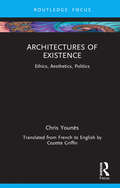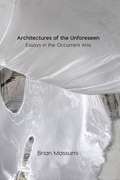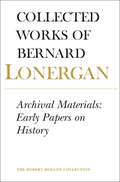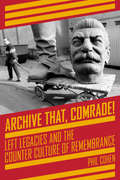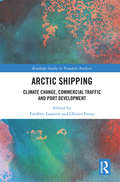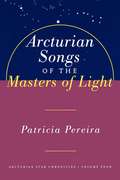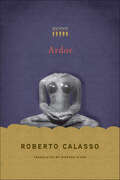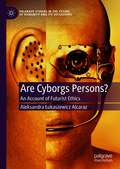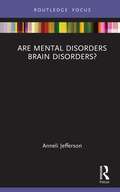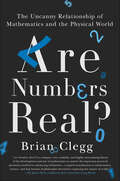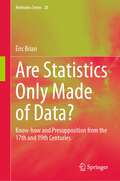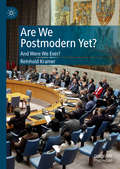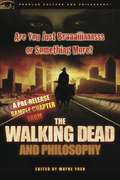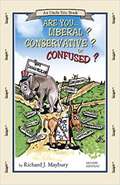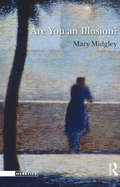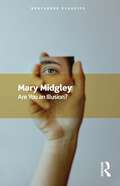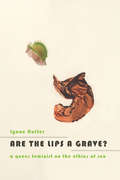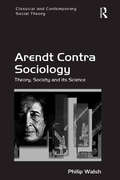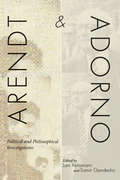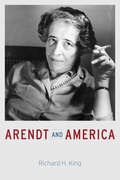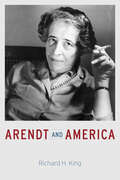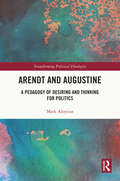- Table View
- List View
Architectures of Existence: Ethics, Aesthetics, Politics
by Chris YounèsArchitectures of Existence proposes that philosophical thinking (ecosophical thinking) can inform the way we engage with our world and its inhabitants, as architects, designers and planners, but also as individuals, as people, and as a society. In Art et existence, Maldiney states: "For us, to inhabit is to exist". This book aims to unfold, extend, articulate and thicken this postulate by interweaving architecture, city, landscape, literature and philosophy. It takes up the synergistic lines of long-term research carried out from an ecosophical perspective. Such an attitude explores an art of existing in multiplicity, singularity and openness, manifesting the critical dimension through a reinterpretation of the knotting of the trajectories of time, humanity and its becoming. Insisting on what is between things and beings as well as on what is happening, regenerating, recycling, reviving, saving, diversifying, sparing, recreating, meditating: and so caring. These are all eco-rhythms of a different type between human and non-human, to consider ourselves in the world. In an era of uncertainty and climate threats, this book develops the margins of possibility offered by the subject of architecture. This book will be of interest to researchers and students of architecture, urban planning and philosophy.
Architectures of the Unforeseen: Essays in the Occurrent Arts
by Brian MassumiA beautifully written study of three pioneering artists, entwining their work and our understanding of creativity Bringing the creative process of three contemporary artists into conversation, Architectures of the Unforeseen stages an encounter between philosophy and art and design. Its gorgeous prose invites the reader to think along with Brian Massumi as he thoroughly embodies the work of these artists, walking the line that separates theory from art and providing equally nurturing sustenance for practicing artists and working philosophers.Based on Massumi&’s lengthy—and in two cases decades-long—relationships with digital architect Greg Lynn, interactive media artist Rafael-Lozano Hemmer, and mixed-media installation creator Simryn Gill, Architectures of the Unforeseen delves into their processes of creating art. The book&’s primary interest is in what motivates each artist&’s practice—the generative knots that inspire creativity—and in how their pieces work to give off their unique effects. More than a series of profiles or critical pieces, Massumi&’s essays are creative, developing new philosophical concepts and offering rigorous sentiments about art and creativity.Asking fundamental questions about nature, culture, and the emergence of the new, Architectures of the Unforeseen is important original research on artists that are pioneers in their field. Equally valuable to the everyday reader and those engaged in scholarly work, it is destined to become an important book not only for the fields of digital architecture, interactive media, and installation art, but also more basically for our knowledge of art and creativity.
Archival Material: Early Papers on History, Volume 25 (Collected Works of Bernard Lonergan #25)
by Lonergan Research InstituteIn the mid- to late-1930s, while he was a student at the Gregorian University in Rome, Bernard Lonergan wrote a series of eight essays on the philosophy and theology of history. These essays foreshadow a number of the major themes in his life’s work. The significance of these essays is enormous, not only for an understanding of the later trajectory of Lonergan’s own work but also for the development of a contemporary systematic theology. In an important entry from 1965 in his archival papers, Lonergan wrote that the "mediated object" of systematics is Geschichte or the history that is lived and written about. In the same entry, he stated that the "doctrines" that this systematic theology would attempt to understand are focused on "redemption." The seeds of such a theology are planted in the current volume, where the formulae that are so pronounced in his later work first appear. Students of Lonergan’s work will find their understanding of his philosophy profoundly affected by the essays in this volume.
Archive That, Comrade!: Left Legacies and the Counter Culture of Remembrance (KAIROS)
by Phil CohenAfter a brief introduction that sets the contemporary scene of "archive fever," this book considers the political legacy of 1960s counterculture for what it reveals about the process of commemoration. How far can the archive serve as a platform for dialogue and debate between different generations of activists in a culture that fetishizes the evanescent present, practices a profound amnesia about its counterfactual past, and forecloses the sociological imagination of an alternative future? Can the Left establish its own autonomous model of commemoration?
Archives of Infamy: Foucault on State Power in the Lives of Ordinary Citizens
by Michel Foucault Lynne Huffer Arlette Farge Stuart Elden Roger Chartier Pierre Nora Jean-Philippe Guinle Michel Heurteaux Michael Rey Elizabeth WingroveExpanding the insights of Arlette Farge and Michel Foucault&’s Disorderly Families into policing, public order, (in)justice, and daily life What might it mean for ordinary people to intervene in the circulation of power between police and the streets, sovereigns and their subjects? How did the police come to understand themselves as responsible for the circulation of people as much as things—and to separate law and justice from the maintenance of a newly emergent civil order? These are among the many questions addressed in the interpretive essays in Archives of Infamy.Crisscrossing the Atlantic to bring together unpublished radio broadcasts, book reviews, and essays by historians, geographers, and political theorists, Archives of Infamy provides historical and archival contexts to the recent translation of Disorderly Families by Arlette Farge and Michel Foucault. This volume includes new translations of key texts, including a radio address Foucault gave in 1983 that explains the writing process for Disorderly Families; two essays by Foucault not readily available in English; and a previously untranslated essay by Farge that describes how historians have appropriated Foucault.Archives of Infamy pushes past old debates between philosophers and historians to offer a new perspective on the crystallization of ideas—of the family, gender relations, and political power—into social relationships and the regimes of power they engender. Contributors: Roger Chartier, Collège de France; Stuart Elden, U of Warwick; Arlette Farge, Centre national de recherche scientifique; Michel Foucault (1926–1984); Jean-Philippe Guinle, Catholic Institute of Paris; Michel Heurteaux; Pierre Nora, École des Hautes Études en Sciences Sociales; Michael Rey (1953–1993); Thomas Scott-Railton; Elizabeth Wingrove, U of Michigan.
Arctic Shipping: Climate Change, Commercial Traffic and Port Development (Routledge Studies in Transport Analysis)
by Édéric Lasserre Olivier FauryThis book considers both the present state of Arctic shipping and possible future trends with reference to the various sectors of maritime transportation: cruise tourism, container traffic and bulk shipping. Ports are analysed as tools that support the strategies of coastal states to foster the development of resource extraction, enhance the attractiveness of Arctic shipping lanes and enable the control of maritime activities through coast guard deployment. The aim of this book is to draw a picture of the trends of Arctic shipping. How is traffic evolving in Canada’s Arctic, or along the Northern Sea Route? Are there significant differences between bulk and container shipping segments when considering the Arctic market? How are the ports and the hinterland developing and what are the strategies behind those? How is the legal framework shaping the evolution of maritime transportation? The contributors to this book consider all of these questions, and more, as they map out the prospects for Arctic shipping and analyse in detail the development of Arctic shipping as a result of multi-variable interactions. This book will be key reading for industry professionals and post-graduate students alike.
Arcturian Songs Of The Masters Of Light: Arcturian Star Chronicles, Volume Four (The Arcturian Star Chronicles)
by Patricia PereiraIn 1987, medical transcriptionist Patricia Pereira suddenly started receiving telepathic communications from the star Arcturus and was requested to begin a series of galactically inspired manuscripts, Arcturian Songs of the Masters of Light is the fourth volume in the series. The mission of this series of books is to awaken us to our individual and collective spiritual obligation for the health and well being of our planet and all creatures who live upon her. Philosophical in cope, the essays in these books provide pragmatic, practical suggestions for emotional, mental physical, and spiritual transformation. They remind us of our familial relationships to beings of light who inhabit the great star nations. Arcturian Songs of the Masters of Light moves beyond solely Arcturian energies to incorporate high-level representatives of the brotherhoods of light, including Christ Essence and Sanat Kumara of the Order of Melchizedek.
Ardor
by Roberto CalassoIn a meditation on the wisdom of the Vedas, Roberto Calasso's Ardor brings ritual and sacrifice to bear on the modern worldIn this revelatory volume, Roberto Calasso, whom The Paris Review has called "a literary institution," explores the ancient texts known as the Vedas. Little is known about the Vedic people, who lived more than three thousand years ago in northern India: They left behind almost no objects, images, or ruins. They created no empires. Even the soma, the likely hallucinogenic plant that appears at the center of some of their rituals, has not been identified with any certainty. Only a "Parthenon of words" remains: verses and formulations suggesting a daring understanding of life."If the Vedic people had been asked why they did not build cities," writes Calasso, "they could have replied: we did not seek power, but rapture." This is the ardor of the Vedic world, a burning intensity that is always present, both in the mind and in the cosmos. With his signature erudition and profound sense of the past, Calasso explores the enigmatic web of ritual and myth that defines the Vedas. Often at odds with modern thought, these texts illuminate the nature of consciousness more vividly than anything else has managed to till now. Following the "hundred paths" of the Satapatha Brahmana, an impressive exegesis of Vedic ritual, Ardor indicates that it may be possible to reach what is closest by passing through that which is most remote, as "the whole of Vedic India was an attempt to think further."
Are Cyborgs Persons?: An Account of Futurist Ethics (Palgrave Studies in the Future of Humanity and its Successors)
by Aleksandra Łukaszewicz AlcarazThis book presents argumentation for an evolutionary continuity between human persons and cyborg persons, based on the thought of Joseph Margolis. Relying on concepts of cultural realism and post-Darwinism, Aleksandra Łukaszewicz Alcaraz redefines the notion of the person, rather than a human, and discusses the various issues of human body enhancement and online implants transforming modes of perception, cognition, and communication. She argues that new kinds of embodiment should not make acquiring the status of the person impossible, and different kinds of embodiments may be accepted socially and culturally. She proposes we consider ethical problems of agency and responsibility, critically approaching vitalist posthuman ethics, and rethinking the metaphysical standing of normativity, to create space for possible cyborgean ethics that may be executed in an Extended Republic of Humanity.
Are Liberty and Equality Compatible?
by James P. Sterba Jan NarvesonAre the political ideals of liberty and equality compatible? This question is of central and continuing importance in political philosophy, moral philosophy, and welfare economics. In this book, two distinguished philosophers take up the debate. Jan Narveson argues that a political ideal of negative liberty is incompatible with any substantive ideal of equality, while James P. Sterba argues that Narveson's own ideal of negative liberty is compatible, and in fact leads to the requirements of a substantive ideal of equality. Of course, they cannot both be right. Thus, the details of their arguments about the political ideal of negative liberty and its requirements will determine which of them is right. Engagingly and accessibly written, their debate will be of value to all who are interested in the central issue of what are the practical requirements of a political ideal of liberty.
Are Mental Disorders Brain Disorders? (Routledge Focus on Philosophy)
by Anneli JeffersonThe question of whether mental disorders are disorders of the brain has led to a long-running and controversial dispute within psychiatry, psychology and philosophy of mind and psychology. While recent work in neuroscience frequently tries to identify underlying brain dysfunction in mental disorders, detractors argue that labelling mental disorders as brain disorders is reductive and can result in harmful social effects. This book brings a much-needed philosophical perspective to bear on this important question. Anneli Jefferson argues that while there is widespread agreement on paradigmatic cases of brain disorder such as brain cancer, Parkinson's or Alzheimer’s dementia, there is far less clarity on what the general, defining characteristics of brain disorders are. She identifies influential notions of brain disorder and shows why these are problematic. On her own, alternative, account, what counts as dysfunctional at the level of the brain frequently depends on what counts as dysfunctional at the psychological level. On this notion of brain disorder, she argues, many of the consequences people often associate with the brain disorder label do not follow. She also explores the important practical question of how to deal with the fact that many people do draw unlicensed inferences about treatment, personal responsibility or etiology from the information that a condition is a brain disorder or involves brain dysfunction.
Are Numbers Real?: The Uncanny Relationship of Mathematics and the Physical World
by Brian Clegg“A lighthearted yet far-reaching look at the history of numbers and how we use them.” —Publishers WeeklyHave you ever wondered what humans did before numbers existed? How they organized their lives, traded goods, or kept track of their treasures? What would your life be like without them?Numbers began as simple representations of everyday things, but mathematics rapidly took on a life of its own, occupying a parallel virtual world. In Are Numbers Real?, Brian Clegg explores the way that math has become more and more detached from reality, and yet despite this is driving the development of modern physics. From devising a new counting system based on goats, through the weird and wonderful mathematics of imaginary numbers and infinity, to the debate over whether mathematics has too much influence on the direction of science, this fascinating and accessible book opens the reader’s eyes to the hidden reality of the strange yet familiar entities that are numbers.Praise for Are Numbers Real?“A compact, very readable, and highly entertaining history of the development and use of mathematics to answer the important practical questions involved in advancing civilization . . . a superb introduction to mathematics, science, and that branch of philosophy devoted to exploring the nature of reality.” —Dr. James Stein, California State University, Long Beach“Clegg tackles a very deep question in his usual way; with clarity, wit and a wonderfully clear narrative writing style. For me, numbers are like natural language: They obviously don’t exist in a physical sense—you cannot trip over the number 2 in the street—yet numbers are at the heart of understanding the universe. Clegg covers a wide variety of subjects to seek out the truth of the matter in an engaging and hugely accessible way. I personally couldn’t put it down.” —Dr. Peet Morris, University of Oxford
Are Statistics Only Made of Data?: Know-how and Presupposition from the 17th and 19th Centuries (Methodos Series #20)
by Éric BrianThis book examines several epistemological regimes in studies of numerical data over the last four centuries. It distinguishes these regimes and mobilises questions present in the philosophy of science, sociology and historical works throughout the 20th century. Attention is given to the skills of scholars and their methods, their assumptions, and the socio-historical conditions that made calculations and their interpretations possible. In doing so, questions posed as early as Émile Durkheim’s and Ernst Cassirer’s ones are revisited and the concept of symbolic form is put to the test in this particular survey, conducted over long period of time. Although distinct from a methodological and epistemological point of view, today these regimes may be found together in the toolbox of statisticians and those who comment on their conclusions. As such, the book is addressed to social scientists and historians and all those who are interested in numerical productions.
Are We Postmodern Yet?: And Were We Ever?
by Reinhold KramerIn this book, Reinhold Kramer explores a variety of important social changes, including the resistance to objective measures of truth, the rise of “How-I-Feel” ethics, the ascendancy of individualism, the immersion in cyber-simulations, the push toward globalization and multilateralism, and the decline of political and religious faiths. He argues that the displacement, since the 1990s, of grand narratives by ego-based narratives and small narratives has proven inadequate, and that selective adherence, pluralist adaptation, and humanism are more worthy replacements. Relying on evolutionary psychology as much as on Charles Taylor, Kramer argues that no single answer is possible to the book title’s question, but that the term “postmodernity” – referring to the era, not to postmodernism – still usefully describes major currents within the contemporary world.
Are You Just Braaaiiinnnsss or Something More?
by Wayne YuenIn Are You Just Braaaiiinnnsss or Something More?, British Columbia-based philosopher Gordon Hawkes compares the zombies of The Walking Dead with the zombies philosophers argue about. Debate about whether zombies could possibly exist has been a hot topic in philosophy of mind over the last thirty years, though as Hawkes points out, these are not quite the same as the walkers in Robert Kirkman's epic tale. Philosophical zombies, or P-zombies for short, are beings who look and behave exactly like humans but have no inner mental life-no consciousness. Philosophers have lined up on both sides of this disputed proposition, and no agreement is yet in sight. A related question is how much consciousness is possessed by the walkers of The Walking Dead, and whether these shambling walkers are entitled to any moral consideration. Hawkes's piece is one of twenty chapters in The Walking Dead and Philosophy, edited by Wayne Yuen, in which philosophers draw fascinating and disturbing conclusions from The Walking Dead comics and TV show. The Walking Dead and Philosophy explores not only the nature of zombies, but the nature of human society as revealed by the impact of a zombie apocalypse.
Are You Liberal? Conservative? Or Confused? (An "Uncle Eric" Book #4)
by Richard J. Maybury Jane A. Williams"Are You Liberal? Conservative? or Confused?" discusses political labels. What do they mean? Liberal, conservative, left, right, democrat, republican, moderate, socialist, libertarian, communist what are their economic policies and what plans do their promoters have for your money? Clear, concise explanations. Facts and fallacies. Does inconsistency to the original American philosophy endanger liberty? To improve the student's learning experience, also purchase the student study guide for "Are You Liberal? Conservative? or Confused?" titled "A Bluestocking Guide: Political Philosophies" also available through Amazon. Can be used for courses in Government, Civics, Election Unit Studies, Economics, Business, Finance, History. Also recommended for further reading is the chapter on "Isms" from the book "Capitalism for Kids" also available through Amazon.
Are You an Illusion? (Heretics)
by Mary MidgleyIn Are You an Illusion? today’s scientific orthodoxy, which treats the self as nothing more than an elaborate illusion, comes under spirited attack. In an impassioned defence of the importance of our own thoughts, feelings and experiences, Mary Midgley shows that there’s much more to our selves than a jumble of brain cells.Exploring the remarkable gap that has opened up between our understanding of our own sense of self and today’s science, she exposes some very odd claims and muddled thinking on the part of cognitive scientists and psychologists when they talk about the self and shows that many well-known philosophical problems in causality and free have been glossed over.Midgley argues powerfully and persuasively that the rich variety of our imaginative life cannot be contained in the narrow bounds of a highly puritanical materialism that simply equates brain and self. Engaging with the work of prominent thinkers, Midgley investigates the source of our current attitudes to the self and reveals how ideas, traditions and myths have been twisted to fit in, seemingly naturally, with science’s current preoccupation with the physical and, in doing so, have made many other valuable activities and ideas appear as anti-scientific. Midgley shows that the subjective sources of thought – our own experiences – are every bit as necessary in helping to explain the world as the objective ones such as brain cells.Are You an Illusion? offers a salutary analysis of science’s claim to have done away with the self and a characteristic injection of common sense from one of our most respected philosophers into a debate increasingly in need of it.
Are You an Illusion? (Routledge Classics)
by Mary MidgleyIn an impassioned defence of the importance of our own thoughts, feelings and experiences, the renowned philosopher Mary Midgley shows that there’s much more to our selves than a jumble of brain cells. Exploring the remarkable gap that has opened up between our understanding of our sense of self and today’s science, Midgley argues powerfully and persuasively that the rich variety of our imaginative life cannot be contained in the narrow bounds of a highly puritanical materialism that simply equates brain and self. Engaging with the work of prominent thinkers, Midgley investigates the source of our current attitudes to the self and reveals how ideas, traditions and myths have been twisted to fit in, seemingly naturally, with science’s current preoccupation with the physical and material. Midgley shows that the subjective sources of thought – our own experiences – are every bit as necessary in helping to explain the world as the objective ones such as brain cells. Are You an Illusion? offers a salutary analysis of science’s claim to have done away with the self and a characteristic injection of common sense from one of our most respected philosophers into a debate increasingly in need of it. This Routledge Classics edition includes a new Foreword by Stephen Cave.
Are the Lips a Grave?
by Lynne HufferLynne Huffer's ambitious inquiry redresses the rift between feminist and queer theory, traversing the space of a new, post-moral sexual ethics that includes pleasure, desire, connection, and betrayal. She begins by balancing queer theorists' politics of sexual freedoms with a moralizing feminist politics that views sexuality as harm. Drawing on the best insights from both traditions, she builds an ethics centered on eros, following Michel Foucault's ethics as a practice of freedom and Luce Irigaray's lyrical articulation of an ethics of sexual difference.Through this theoretical lens, Huffer examines everyday experiences of ethical connection and failure connected to sex, including queer sexual practices, sodomy laws, interracial love, pornography, and work-life balance. Her approach complicates sexual identities while challenging the epistemological foundations of subjectivity. She rethinks ethics "beyond good and evil" without underestimating, as some queer theorists have done, the persistence of what Foucault calls the "catastrophe" of morality. Elaborating a thinking-feeling ethics of the other, Huffer encourages contemporary intellectuals to reshape sexual morality from within, defining an ethical space that is both poetically suggestive and politically relevant, both conceptually daring and grounded in common sexual experience.
Are the Lips a Grave?: A Queer Feminist on the Ethics of Sex
by Lynne HufferLynne Huffer's ambitious inquiry redresses the rift between feminist and queer theory, traversing the space of a new, post-moral sexual ethics that includes pleasure, desire, connection, and betrayal. She begins by balancing queer theorists' politics of sexual freedoms with a moralizing feminist politics that views sexuality as harm. Drawing on the best insights from both traditions, she builds an ethics centered on eros, following Michel Foucault's ethics as a practice of freedom and Luce Irigaray's lyrical articulation of an ethics of sexual difference.Through this theoretical lens, Huffer examines everyday experiences of ethical connection and failure connected to sex, including queer sexual practices, sodomy laws, interracial love, pornography, and work-life balance. Her approach complicates sexual identities while challenging the epistemological foundations of subjectivity. She rethinks ethics "beyond good and evil" without underestimating, as some queer theorists have done, the persistence of what Foucault calls the "catastrophe" of morality. Elaborating a thinking-feeling ethics of the other, Huffer encourages contemporary intellectuals to reshape sexual morality from within, defining an ethical space that is both poetically suggestive and politically relevant, both conceptually daring and grounded in common sexual experience.
Arendt Contra Sociology: Theory, Society and its Science (Classical And Contemporary Social Theory Ser.)
by Philip WalshHannah Arendt is today widely regarded today as a political theorist, who sought to rescue politics from society, and political theory from the social sciences. But this view has had the effect of distracting attention from many of Arendt's most important insights concerning the constitution of society, and the significance of its 'science', sociology. Arendt Contra Sociology re-assesses the relationship between Arendt's work and the theoretical foundations of sociology, bringing her insights to bear on some key themes within contemporary theoretical sociology. Re-reading Arendt's distinctions between labour, fabrication and action as a theory of the fundamental ontology of human societies, this book assesses her criticism of the tendency of many sociological paradigms to conflate the activity of fabrication with that of action. It re-examines Arendt's understanding of central areas of research within contemporary theoretical sociology - including the meaning of power, the trajectory of modern science, the rise of consumerism and the problem of reflexivity. This volume offers a comprehensive reconstruction of Arendt's thought, uncovering its refutation of, or latent contribution to, key sociological approaches. It will be of interest to sociologists, social and political theorists and philosophers of social science.
Arendt and Adorno: Political and Philosophical Investigations
by Lars Rensmann Samir GandeshaHannah Arendt and Theodor W. Adorno, two of the most influential political philosophers and theorists of the twentieth century, were contemporaries with similar interests, backgrounds, and a shared experience of exile. Yet until now, no book has brought them together. In this first comparative study of their work, leading scholars discuss divergences, disclose surprising affinities, and find common ground between the two thinkers. This pioneering work recovers the relevance of Arendt and Adorno for contemporary political theory and philosophy and lays the foundation for a critical understanding of political modernity: from universalistic claims for political freedom to the abyss of genocidal politics.
Arendt and America
by Richard H. KingGerman-Jewish political philosopher Hannah Arendt (1906-75) fled from the Nazis to New York in 1941, and during the next thirty years in America she wrote her best-known and most influential works, such as The Human Condition, The Origins of Totalitarianism, and On Revolution. Yet, despite the fact that a substantial portion of her oeuvre was written in America, not Europe, no one has directly considered the influence of America on her thought--until now. In Arendt and America, historian Richard H. King argues that while all of Arendt's work was haunted by her experience of totalitarianism, it was only in her adopted homeland that she was able to formulate the idea of the modern republic as an alternative to totalitarian rule. Situating Arendt within the context of U. S. intellectual, political, and social history, King reveals how Arendt developed a fascination with the political thought of the Founding Fathers. King also re-creates her intellectual exchanges with American friends and colleagues, such as Dwight Macdonald and Mary McCarthy, and shows how her lively correspondence with sociologist David Riesman helped her understand modern American culture and society. In the last section of Arendt and America, King sets out the context in which the Eichmann controversy took place and follows the debate about "the banality of evil" that has continued ever since. As King shows, Arendt's work, regardless of focus, was shaped by postwar American thought, culture, and politics, including the Civil Rights Movement and the Cold War. For Arendt, the United States was much more than a refuge from Nazi Germany; it was a stimulus to rethink the political, ethical, and historical traditions of human culture. This authoritative combination of intellectual history and biography offers a unique approach for thinking about the influence of America on Arendt's ideas and also the effect of her ideas on American thought.
Arendt and America
by Richard H. KingGerman-Jewish political philosopher Hannah Arendt (1906–75) fled from the Nazis to New York in 1941, and during the next thirty years in America she wrote her best-known and most influential works, such as The Human Condition, The Origins of Totalitarianism, and On Revolution. Yet, despite the fact that a substantial portion of her oeuvre was written in America, not Europe, no one has directly considered the influence of America on her thought—until now. In Arendt and America, historian Richard H. King argues that while all of Arendt’s work was haunted by her experience of totalitarianism, it was only in her adopted homeland that she was able to formulate the idea of the modern republic as an alternative to totalitarian rule. Situating Arendt within the context of U.S. intellectual, political, and social history, King reveals how Arendt developed a fascination with the political thought of the Founding Fathers. King also re-creates her intellectual exchanges with American friends and colleagues, such as Dwight Macdonald and Mary McCarthy, and shows how her lively correspondence with sociologist David Riesman helped her understand modern American culture and society. In the last section of Arendt and America, King sets out the context in which the Eichmann controversy took place and follows the debate about “the banality of evil” that has continued ever since. As King shows, Arendt’s work, regardless of focus, was shaped by postwar American thought, culture, and politics, including the Civil Rights Movement and the Cold War. For Arendt, the United States was much more than a refuge from Nazi Germany; it was a stimulus to rethink the political, ethical, and historical traditions of human culture. This authoritative combination of intellectual history and biography offers a unique approach for thinking about the influence of America on Arendt’s ideas and also the effect of her ideas on American thought.
Arendt and Augustine: A Pedagogy of Desiring and Thinking for Politics (Transforming Political Theologies)
by Mark AloysiusThis book addresses a lacuna in scholarship concerning Hannah Arendt’s Augustinian heritage that has predominantly focused on her early work. It de-canonises the sources that political theology has appealed to by shifting the interpretive focus to her mature treatment in The Life of the Mind. Arendt’s initial criticism of Augustinian desiring is that it generates 'worldlessness'. In her later works, Arendt develops a more nuanced reading of the movements of thinking, desiring, and loving in her engagement with Augustine. This study attends to these movements and inspects the spatio-temporal framework which structure Arendt’s conception of the political. The author assesses the claim that Arendt’s conception of the political is drawn from a pedagogy of desiring and thinking from Augustine severed from his mystagogy. Although respecting the method of political theory, the author contends that Arendt’s severing of Augustinian pedagogy from mystagogy brings her to an insurmountable aporia. Instead, the author embeds these pedagogical practices within Augustine’s theology and suggests how that aporia might be overcome and used to develop a mystagogy for contemporary political life. The book will be of particular interest to scholars of political theology, as well as political theory, and political philosophy.
